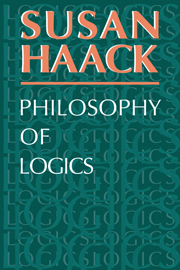Book contents
- Frontmatter
- ACKNOWLEDGMENTS
- Contents
- Preface
- Notation and abbreviation
- 1 ‘Philosophy of logics’
- 2 Validity
- 3 Sentence connectives
- 4 Quantifiers
- 5 Singular terms
- 6 Sentences, statements, propositions
- 7 Theories of truth
- 8 Paradoxes
- 9 Logic and logics
- 10 Modal logic
- 11 Many-valued logic
- 12 Some metaphysical and epistemological questions about logic
- Glossary
- Advice on reading
- Bibliography
- Index
Preface
Published online by Cambridge University Press: 05 June 2012
- Frontmatter
- ACKNOWLEDGMENTS
- Contents
- Preface
- Notation and abbreviation
- 1 ‘Philosophy of logics’
- 2 Validity
- 3 Sentence connectives
- 4 Quantifiers
- 5 Singular terms
- 6 Sentences, statements, propositions
- 7 Theories of truth
- 8 Paradoxes
- 9 Logic and logics
- 10 Modal logic
- 11 Many-valued logic
- 12 Some metaphysical and epistemological questions about logic
- Glossary
- Advice on reading
- Bibliography
- Index
Summary
The century since the publication of Frege's Begriffsschrift has seen a tremendous growth in the development and study of logical systems. The variety of this growth is as impressive as its scale. One can distinguish four major areas of development, two in formal, two in philosophical studies: (i) the development of the standard logical apparatus, beginning with Frege's and Russell and Whitehead's presentation of the syntax of sentence and predicate calculi, subsequently supplied with a semantics by the work of e.g. Post, Wittgenstein, Löwenheim and Henkin, and studied metalogically in the work of e.g. Church and Gödel; (ii) the development of non-standard calculi, such as the modal logics initiated by C. I. Lewis, the many-valued logics initiated by Łukasiewicz and Post, the Intuitionist logics initiated by Brouwer. Alongside these one has (iii) philosophical study of the application of these systems to informal argument, of the interpretation of the sentence connectives and quantifiers, of such concepts as truth and logical truth; and (iv) study of the aims and capacities of formalisation, by those, such as Carnap and Quine, who are optimistic about the philosophical significance of formal languages, by those, such as F. C. S. Schiller and Strawson, who are sceptical of the pretensions of symbolic logic to philosophical relevance, and by those, such as Dewey, who urge a more psychological and dynamic conception of logic over the prevailing one.
- Type
- Chapter
- Information
- Philosophy of Logics , pp. xi - xivPublisher: Cambridge University PressPrint publication year: 1978



